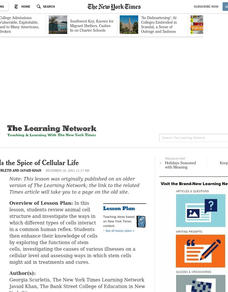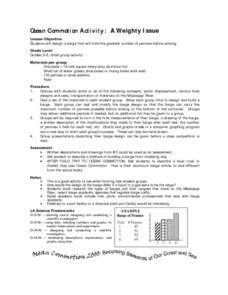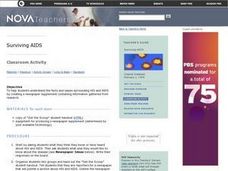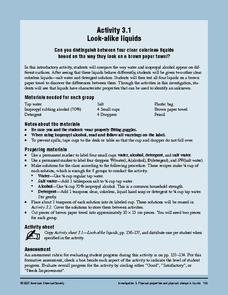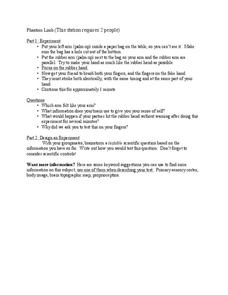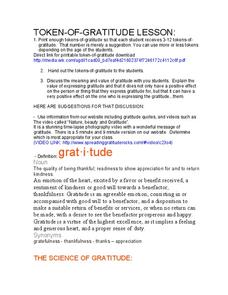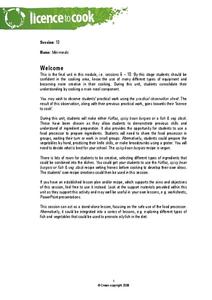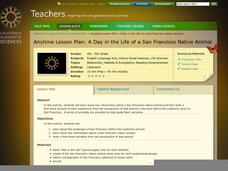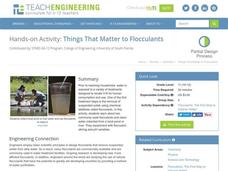Curated OER
Sustainability
Here is an in-depth, and incredibly thorough lesson plan on sustainable agricultural practices; specifically, regarding the growth of coffee. After completing and discussing a worksheet called "Thinking About Tomorrow," groups of...
Curated OER
Fossil Fuels (Part III), The Geology of Coal
Do not overlook this set of lessons just because your school does not have a data analysis system. There is plenty of material here to administer a complete mini unit on the formation, distribution, and properties of coal. Since it...
Curated OER
Variety Is the Spice of Cellular Life
Do you need to review animal cell structure? Investigate the ways in which different types of cells interact in a common human reflex. Your students can explore the functions of stem cells, consider various illnesses and assess stem...
Curated OER
The Ultimate Classroom: R & D
Redecorate a classroom on a budget. Middle schoolers rebuild a classroom after a disaster. They conduct Internet research to determine construction supplies needed and the most cost effective way to reach the predetermined results. They...
Curated OER
"Lettuce" Learn About the Water Cycle
Young scientists investigate the water cycle through a lettuce seed experiment. For this experiment, learners plant lettuce seeds inside of a ziplock bag in order to create a small greenhouse. They observe condensation and precipitation,...
Curated OER
A Weighty Issue
Want to get your students motivated in science class? Given only a piece of aluminum foil, assign groups the task of designing a "barge" that will support the weight of a bunch of pennies. The group who is able to put the most pennies...
Curated OER
Surviving AIDS
Enhance your middle and high schoolers' research skills with this lesson. After viewing a video clip about HIV and AIDS, high schoolers identify the facts and issues surrounding the disease. They work together to create a newspaper...
Berkeley Engineering and Mentors
Egg Drop
How do different shapes affect the outcome associated with hard impact? All you need is an egg and some recycled materials to find out. Kids experiment to understand how airbags work to lessen the impact of two different types of...
American Chemical Society
Why Does Water Dissolve Sugar?
Did you know that if you wait long enough, the M on the outside of an M and M will float to the surface when submerged in water? Learners observe the sugar coating of an M and M while it is dissolving in water. They explain how this...
American Chemical Society
Look-Alike Liquids
Here is the first of four experiments to differentiate among unknown liquids by their behaviors and properties. Pupils observe how different liquids respond to being placed on plastic and paper, and they take notes about their...
Curated OER
Isopod Behavior, of the Rolly Polly Lab
Learners investigate the behavior of isopods. In this isopod lesson plan, students make observations of an isopod and sketch the pillbug. They study the orientation of the isopods in relation to moisture in a chamber they construct from...
Curated OER
Paper Production
Students compare paper making by hand and by assembly line. In this manufacturing lesson, students compare and contrast the two main ways to make paper, by hand or by machine. Students research paper making and have a class discussion...
Curated OER
A Handy Measure
How many hands tall are you? Challenge kids to measure themselves the way the 19th century Oklahoma horse traders measured their prize horses (can they guess how many hands tall a horse had to be?). There's some background information...
University of Minnesota
Phantom Limb
A phantom of neuroscience may leave pupils perplexed as they engage in an experimental lesson that recreates a phantom limb scenario. After experiencing the phenomenon, they choose a scientific question to explore further.
Curated OER
Evaporation Inquiry
The evaporation of water and what happens to it as it travels through the water cycle are the focuses of this instructional activity. The evaporation of water seems like a "magical" process to people of all ages. This instructional...
Spreading Gratitude Rocks
Token of Gratitude
What would the world be like if everyone expressed gratitude? Pupils explore the concept by watching a motivating time-lapse video. Scholars express appreciation by handing out tokens of gratitude, and then write about their experiences.
Curated OER
Mini Meals
Learners discuss what makes a healthy and balanced meal, and then they make them out of clay. They use hand building techniques, radial design, and their knowledge of healthy foods to create unique mini-sized meals for a wall display.
K5 Learning
The Astronomy Project
A passage about an astronomy lesson may leave readers starstruck. Fifth graders read about a class's exploration into the makeup of the galaxy and its constellations before answering six questions about the terms and vocabulary words...
California Academy of Science
A Day inthe Life of a San Francisco Native Animal
Although the lesson is specifically about the San Francisco Bay area, it's good enough to be adapted to any local region. Children research what the landscape in San Francisco was like prior to settlement, they consider the types of...
Curated OER
Plankton Parade
Plankton isn't just a tiny cartoon character, it's also a very important food source for animals around the world. Budding scientists discuss the types and functions of plankton, including where they are found, how they are caught, and...
Teach Engineering
Electricity and Magnetic Fields
Introduce your class to the idea of magnetic fields around electrical wires with an activity that provides the information about the direction of a magnetic field around a wire carrying an electric current.
EnLiST
Trap Your Own Insects: What’s in Your Backyard?
Young entomologists construct three types of insect traps—pitfall, pollinator, and panel—before setting their traps out and observing what they caught. They then observe what types of insects the different traps attract.
Curated OER
Erupting Volcanoes!
Learners examine the causes of earthquakes, volcanoes, and floods, and explore how these events shape the surface of the earth. In this erupting volcanoes lesson, students create a volcano model of their own, make observations about how...
Teach Engineering
Things That Matter to Flocculants
How does the dirt get out of your drinking water? A hands-on activity introduces the use of flocculants to help clear solid particles out of water. The plan walks learners through the process of setting up an experiment that controls the...




